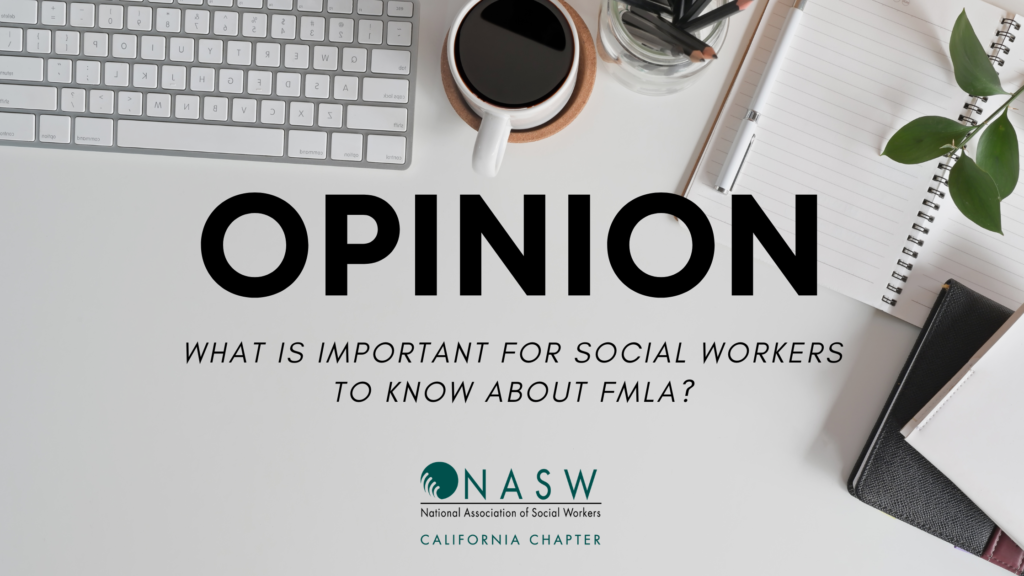
While we are proud to feature opinion pieces from our members and colleagues in the field, be advised that opinions and advertisements shared by NASW-CA do not necessarily reflect the views of the National Association of Social Workers, CA Chapter. This article was written by Advanced Policy students from Cal State Long Beach.
Monica Santos
Ester Marin
Deida Torres
Cynthia Tiznado
Adelina Cervantes
Major: Master of Social Work (MSW)
Social Work 605: Advanced Policy at California State University, Long Beach
When discussing the NASW Code of Ethics for a Social Worker, knowing what resources are offered to employees in their job is important as it fulfils the services to their clients. Additionally, understanding the FMLA requirements and eligibility are necessary for Social Workers to educate their clients. It is important to gain knowledge and understanding of how social justice can be gained for clients in their jobs and for a Social Worker through the FMLA.
What is the Family Medical Leave Act?
According to the Family Medical Leave Act (FMLA), employees are entitled to 12 weeks of paid time off per year to adhere to urgent personal and family obligations.
An eligible employee can be protected for 12 work weeks of unpaid leave by an employer; the employee needs to have worked for a minimum of 12-months with a qualifying employer. The following reasons an employee can take FMLA:
- Having given birth to a child to bond with the baby
- Adoption or foster care of a child
- Care for an immediate family member (child, spouse, or parent)
- Serious health conditions as mental and physical health qualify for FMLA
Under FMLA, employees can continue to receive insurance benefits as if the employee is still working. FMLA also protects employees’ returns to their same position or an equivalent position following their leave. Individuals who have family or relatives enlisted in the military are also protected by FMLA for the reasons of deployment. In addition, there is a 26-week period of protection within FMLA for individuals who are service members if they have a serious injury or illness.
Who is Eligible for FMLA?
For employees to be eligible to receive FMLA, employees need to fulfill certain requirements. First, the employee must work for an employer that provides FMLA coverage. Additionally, the employee must have worked for the employer for at least 12 months and have worked 1,250 hours within those 12 months before starting a leave. The employee must also work for an employer that has at least 50 or more employees within a 75 mile distance.
There is a 30-day advance notice that an employee should provide to their employer before beginning FMLA leave. However, some circumstances can cause the employee to not be able to abide by the timeline. In these circumstances, the employee should notify the employer as soon as they know of their need for leave to abide by the appropriate customary notice and procedural requirements for requesting leave. Upon returning to the job after an employee’s unpaid leave, the employer should return the employee to the same job or a job that is similar to their previous one. Even if certain job tasks are different, the new position must have similar duties, responsibilities, equal pay, and similar benefits.
Other qualifying factors for FMLA may include being under the care of a psychologist or attending psychotherapy sessions regularly, if an individual is released from several days of inpatient treatment for a mental health condition, and when an individual is incapable of self-care because of a disability defined by ADA. There are many reasons related to mental health that an individual may need to take FMLA for themselves or an immediate family member. If the individual suffers from a mental health disorder and may not be able to work due to management of symptoms, they may be eligible for FMLA. The reasons for an individual to take FMLA are required to be kept confidential by employers. Employers are also prohibited from discriminating or retaliating against employees for having or attempting to exercise any FMLA right.
Social workers need to understand the requirements, benefits, and challenges of FMLA. Being knowledgeable of FMLA and its eligibility requirements will be highly beneficial for social workers to provide better service and advocate for social justice for our communities. In the services that social workers provide, they may face problems presented by their clients related to family leave, and knowing this information can allow the social worker to educate and advocate on their behalf. In educating and supporting others, social workers must also abide by the NASW Code of Ethics to better serve our clients and our communities.
Authors’ Biography:
- Monica Santos currently holds a position at Susan G. Komen as a Helpline Specialist Social Worker, she helps provide psychosocial support and gathers resources for breast cancer. She is currently in her third year of an MSW program at CSULB, specializing in child and family welfare while pursuing a Pupil Personnel Services Credential.
- Ester Marin is a third-year graduate student at CSULB and is pursuing her Masters in Social Work. She will be pursuing a Pupil Personnel Services Credential.
- Deida Torres is currently a Children Social Worker, and is a candidate for the Masters in Social Work Program at CSULB.
- Cynthia Tiznado is a Case Manager for FSP Services. She is currently working on a Master’s of Social Work degree with a Specialization in Child and Family Well-being.
- Adelina Cervantes works as a Special Education Assistant and she is currently working on a Master’s of Social Work degree with a Specialization in Child and Family Well-being.











